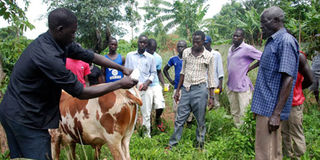Leaders reinstate ban on animal movement

Prevention. A veterinary doctor vaccinates a cow against foot and mouth disease in Arua District in June last year. FILE PHOTO
What you need to know:
- Foot-and-mouth disease is a highly infectious disease of cloven hoofed animals characterised by the formation of vesicles in and around the mouth and on the feet. A recent survey by Mbarara Zonal Agricultural Research and Development Institute revealed that more than 350,000 head of cattle died of FMD, which was confirmed in 63 districts since last October.
Nebbi. Authorities in Nebbi District have reinstated the quarantine on animal movement, two months after the first ban was lifted following new cases of foot and mouth disease.
According to latest reports from the veterinary department, of the 100 animals tested in various sub-counties recently, 80 were found infected with the disease.
The District Production Officer, Dr Anthony Okwir, said tests carried out at the district laboratory revealed that there are high rates of positive reactors among the non-vaccinated cattle in the district.
In September 2017, a quarantine was imposed in the district following the outbreak of the disease in Akworo, Parombo, Nyaravur and Kucwiny sub-counties until July 5 this year when it was lifted.
Dr Okwir said the quarantine was lifted prematurely since more animals were getting infected, requiring more screening.
Traders protest
“It is only a matter of time that animals will start to show overt clinical signs and the disease will flare up again in the district. We do not want this to continue because the farmers are also losing out their animals. So they should be confined and treated,” he said at the weekend.
However, cattle traders have blamed the district for not effectively enforcing the quarantine in the past, which has seen the disease flare up.
Mr Geoffrey Jalum, the chairman Nebbi New Market Butchers Association, blamed the district leadership for failing to vaccinate the animals on time.
“The veterinary department only waits when there is an outbreak to vaccinate the animals. If this was being done before, the disease could have been contained in less than six months,” he said.
Implementing the first quarantine was difficult because cattle owners continued to stealthily slaughter their animals.
Mr Jalum said farmers are headed for hard times since most of them depend on cattle for a livelihood.
“The quarantine will greatly affect their income and loan payments,” Mr Jalum added.
Ms Grace Akello, another trader, said the quarantine poses more threat to people’s health since those who slaughter animals on the black market are not inspected.
“Even if the quarantine is on, we shall always eat meat. The veterinary department should allow open markets to operate but put restrictions on animals being slaughtered before meat is put on the market,” Ms Akello said.
The Chief Administrative Officer, Mr Geoffrey Okaka, said consultations are ongoing on when to effect the quarantine again because if this is not done, the disease will spread to other sub-counties.
ABOUT FOOT AND MOUTH OUTBREAK
Prevalence. Livestock farmers across the country c have suffered unending outbreak of foot and mouth disease since 2015, prompting government to place them under quarantine.
Dangers. Foot-and-mouth disease is a highly infectious disease of cloven hoofed animals characterised by the formation of vesicles in and around the mouth and on the feet. A recent survey by Mbarara Zonal Agricultural Research and Development Institute revealed that more than 350,000 head of cattle died of FMD, which was confirmed in 63 districts since last October. The survey also indicated that the meat value chain is estimated to be losing 23 per cent of potential income due to the outbreak.



